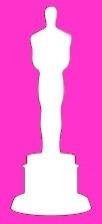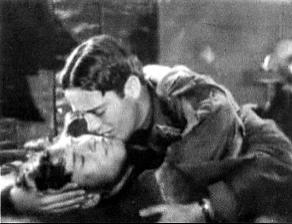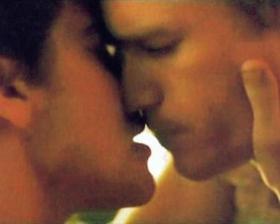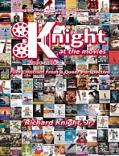
From Wings in 1927 to Brokeback Mountain in 2005 and beyond, Oscar has a queer history
film from a queer perspective
Movie History
| KATM media outlets |
| KATM featured weekly |
| Join Us! |
| KATM on RT |
| Vidcast Starring KATM |
| NOTE: THIS SITE ONLY LOADS CORRECTLY WITH EXPLORER AND MOZILLA BROWSERS - SORRY SAFARI USERS! |
| Buy the KATM Book |
We're Here, We're Queer, We're Award Winners:
Queer at the Oscars - An Overview
Expanded Edition of 3-3-10 WCT Knight at the Movies column
By Richard Knight, Jr.
Queer at the Oscars - An Overview
Expanded Edition of 3-3-10 WCT Knight at the Movies column
By Richard Knight, Jr.
| The announcement that the Oscar nominations for Best Picture would expand from five to ten was greeted with a mixture of cynical caution by the media, aware that the annual Oscar telecast (occurring this year on Sunday, March 7 at 7pm) had been flagging in the ratings thanks to a raft of critical darlings that mainstream audiences didn’t much care about. But the lucky ten that got the nod have proven that the Academy’s decision has been a wise one. From Avatar to Up in the Air, there's seemingly something in the nominations for all audiences. And yes, I include queer movie goers with the inclusion of Precious because of its inherent queer sensibility and positive lesbian characters. Yet once again I find myself irritated with the Oscars. It has ever been thus (I’m still not over Bette Midler losing the Oscar for The Rose to Sally Field for Norma Rae in 1979 – neither is Bette, it still irks me that Judy Parfitt didn’t get a Supporting Actress nomination for Dolores Claiborne, etc.). This year I'm a crabby pants because neither Valentino: The Last Emperor, Outrage, or Capitalism: A Love Story got a documentary nomination. I’m also miffed the Academy passed over Imelda Staunton’s work in Taking Woodstock. But I’m really a sorehead when it comes to the queer movie of the year, A Single Man. Not only was it one of the best reviewed films of 2009, it’s still doing well at the box office. But there was no nod for Best Picture or one for Julianne Moore for Supporting Actress (instead of Penelope Cruz in Nine – did you see it?), or the eye popping cinematography and that gorgeous set design and art direction. And that wistful, achingly beautiful film score – easily the year’s best? Another shut out. Is this another case of fuddy-duddy Academy members dissing a queer movie or a cash strapped Weinstein putting their considerable Oscar campaign finesse behind a proven winner, Inglorious Basterds? Whatever the reason is, when I get all pissy about such matters I take heart by looking back over the history of queer at the Oscars. With a little delving under the red carpet, it comes to light that from its very first ceremony queer movies, actors, and filmmakers have been part of the Oscars (albeit with many of those nominated or awarded closeted – thanks to societal ignorance then and now). A look back reveals many, many of those little golden boys have ended up in the hands of card carrying queers (even if the cards were and continue to be neatly tucked out of plain sight). So here’s a queer historical overview of the Oscars, through the years – just a few of the many, many examples to call up when it seems that the Academy Awards have dissed us: 1927 The very first Best Picture Oscar winner is Wings the story of two WWI fighter pilots. The film, excerpted in The Celluloid Closet, features a homoerotic relationship and deathbed kiss between stars Richard Arlen and Buddy Rogers. 1932-1933 The closeted Charles Laughton wins Best Actor for The Private Life of Henry VIII and suspected bisexual Katharine Hepburn wins Best Actress Morning Glory. 1938 Queer icon Bette Davis wins her second Oscar for Jezebel. 1939 Gay icon Judy Garland wins a child Oscar for her performance as Dorothy in The Wizard of Oz (almost 20 years later she would lose for A Star Is Born – still one of Oscar’s biggest oversights). 1945 Though Ray Milland’s character in the Oscar winning The Lost Weekend is de-gayed for the movies, the homoerotic subtext remains. Gay icon Joan Crawford also wins for Mildred Pierce. 1949 An Oscar goes to gay classical and film composer Aaron Copland’s score for The Heiress with queer star Montgomery Clift and Olivia De Haviland (who wins Oscar gold for Best Actress) and so does openly gay music arranger/composer/producer Roger Edens for Easter Parade (Edens would win again the following year for Annie Get Your Gun). 1950 All About Eve, one of filmdom’s all time queer faves wins Best Picture. Gay costume designer Charles LeMaire shares the Oscar with Edith Head but returns to win by himself in 1955 for Love is a Many Splendored Thing. 1954 Self-described bi-sexual Marlon Brando wins for On the Waterfront after changing movies forever with his brutish, sexually charged performance three years earlier in A Streetcar Named Desire. 1958 Gigi wins nine Oscars including Best Pictures and Best Director for unacknowledged bisexual Vincente Minnelli, gay costume designer Cecil Beaton and lyricist Frederick Loewe for the film’s title song. 1961 West Side Story, a musical created by a coterie of gay men, wins multiple Oscars including Best Picture and one for both directors – Robert Wise and his gay counterpart Jerome Robbins. Closeted gay actor George Chakiris wins Best Supporting Actor. 1964 Closeted gay director George Cukor (and openly gay costume designer Cecil Beaton) win Oscars for My Fair Lady, another Best Picture winner. 1968 Gay and lesbian icons Barbra Streisand and Katharine Hepburn tie for the Best Actress Oscar (Streisand for Funny Girl, Hepburn for Guess Who’s Coming to Dinner?) – uniting both communities in one fell swoop. 1969 The Best Picture Oscar goes to its only X-rated movie (so rated because of suggested queer content) – Midnight Cowboy, essentially a gay love story. Openly queer director John Schlesinger also wins. 1972 Gay icon Liza Minnelli wins Best Actress for Cabaret, a film with unapologetic gay characters. 1983 Lesbian actress Linda Hunt wins Best Supporting Actress for The Year of Living Dangerously playing a male character – a gender bender first at the Oscars. 1984 Amadeus, the Best Picture winner stars out actor Tom Hulce as Mozart the title character. 1985 William Hurt wins Best Actor playing gay in Kiss of the Spider Woman – another Oscar first. 1987 Gay icon Cher wins Best Actress for Moonstruck and sets the fashion bar with her outrageous fashion ensemble designed by queer designer Bob Mackie. 1988 Jodie Foster, who is believed to be a lesbian, wins the first of two Best Actress Oscars for The Accused playing opposite lesbian actress Kelly McGillis. Foster would win again three years later for Silence of the Lambs. 1993 Tom Hanks wins his first Best Actor Oscar playing a gay man with AIDS in Philadelphia. 1994 The first openly gay actor, Nigel Hawthorne, is nominated for Best Actor for The Madness of King George and attends the ceremony with his partner. 1998 Ian McKellen nominated for Gods and Monsters playing gay director James Whale, is the second openly gay actor to get the nod for Best Actor. 1999 Hilary Swank wins the first of two Best Actress Oscars playing the murdered transgendered Brandon Teena in Boys Don’t Cry. 2002 Out director and producer Rob Marshall’s film Chicago wins Best Picture, single handedly bringing musicals back to theatres. Nicole Kidman takes Best Actress playing bisexual author Virginia Woolf in The Hours which also wins a nod for Ed Harris as a gay man suffering from AIDS and Meryl Streep playing his lesbian best friend. 2003 Charlize Theron gives a career altering performance as lesbian serial killer Aileen Wuornos in Monster and wins Best Actress in the process. 2005 The year of the Queer Oscars – Brokeback Mountain loses Best Picture to Crash but wins several other awards, Philip Seymour Hoffman bests Heath Ledger’s Brokeback performance and wins Best Actor playing gay writer Truman Capote in Capote and Felicity Huffman gets a Best Actress nod playing a transgendered woman in Transamerica. 2006 Lesbian icon Melissa Ethridge wins Best Song for “I Need to Wake Up” from An Inconvenient Truth. 2008 Milk wins multiple nominations and Oscars go to Sean Penn and out screenwriter Dustin Lance Black, who both give moving acceptance speeches directed at the gay community. Lesbian fave Penelope Cruz wins Best Supporting Actress for Vicky Cristina Barcelona. |






